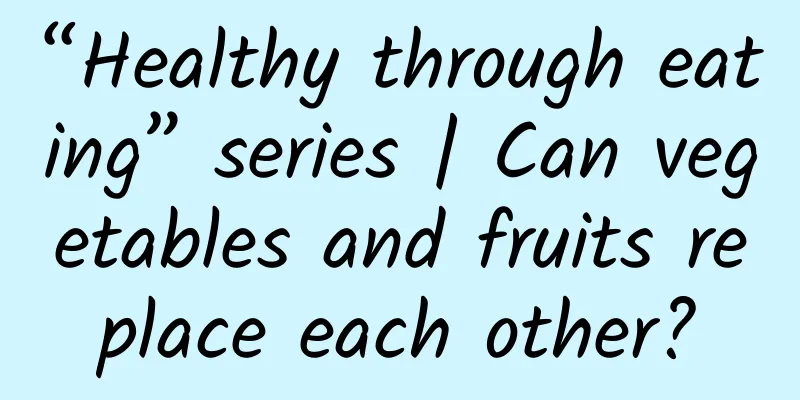“Healthy through eating” series | Can vegetables and fruits replace each other?

|
In daily life, many people think that vegetables and fruits are the same kind of food and can replace each other, but this concept is wrong. The book "Huangdi Neijing Suwen" puts forward that "five grains are for nourishment, five fruits are for assistance, five animals are for benefit, and five vegetables are for filling". It can be seen that the nutritional value of fruits and vegetables has its own characteristics, and neither is indispensable and cannot replace each other. The difference between vegetables and fruits 1. The nutritional content of vegetables and fruits is different Vegetables are rich in minerals, vitamins, dietary fiber, trace elements, etc., and can provide rich nutrients for the human body. In particular, green leafy vegetables are an important source of nutrients such as folic acid, potassium and vitamins in the diet, which can prevent anemia, protect eyesight, enhance immunity and promote gastrointestinal health. Fruits are rich in water, fructose, enzymes, proteins and various nutrients. Most fruits contain organic acids such as citric acid, tartaric acid, malic acid, as well as phenolic and aromatic substances that are not found in vegetables. These substances can stimulate the secretion of digestive juices, stimulate appetite and promote the absorption of various minerals. They also have antibacterial and anti-inflammatory effects, scavenge free radicals, and inhibit platelet aggregation, which are beneficial to human health. 2. The sugar content of vegetables and fruits varies greatly Vegetables contain less sugar. Most of the sugars in vegetables are starch polysaccharides, which need to be broken down into monosaccharides by various enzymes in the human digestive tract before they can be slowly absorbed by the body. Therefore, they will not cause large fluctuations in blood sugar. Fruits, on the other hand, contain glucose, fructose, and sucrose, which have a higher sugar content. After consumption, they are absorbed into the blood through the digestive tract, causing the body's blood sugar to rise rapidly. 3. Different recommended intakes of vegetables and fruits According to the "Balanced Diet Pagoda for Chinese Residents (2022)", the daily vegetable intake per person is 300-500 grams, and the fruit intake is 200-350 grams. Evidence-based research has found that ensuring a rich daily intake of vegetables and fruits can maintain body health, improve obesity, effectively reduce the incidence of cardiovascular diseases, and prevent esophageal cancer, colon cancer, etc. In general, food diversity is the basis of a balanced diet. A single food cannot meet all the nutrients we need in our daily life. Vegetables and fruits have similarities and differences. They complement each other, but they are not completely equivalent. Correctly understanding their respective nutritional components and functions, reasonably matching foods, and having vegetables and fruits at every meal to achieve a balanced and nutritious diet is more conducive to health. Author: Huang Mingyue, Henan University of Science and Technology **Audit expert: ** Wang Yao, Associate Professor of the School of Food and Bioengineering, Henan University of Science and Technology |
Recommend
Fallopian tube paramesonephric duct cyst
For women, the fallopian tube is an extremely imp...
What are some weight loss fitness plans for women?
If women want to lose weight, it is best to make ...
What is the normal age for menopause?
For many women, menstruation is an existence that...
What are female hormones?
Female hormones are the general term for estrogen...
How to fry glutinous rice balls to make them bigger? Calories of glutinous rice balls
Ma Tuan, also known as Jian Dui, is a traditional...
What to do if you have irregular menstruation
Menstrual irregularity is a symptom that many fem...
Catch a cold after medication
Although painless abortion is becoming more and m...
Does appetite decrease during ovulation?
I believe everyone knows the importance of ovulat...
What causes dark spots on a woman's face?
Loving beauty is women's nature. Every woman ...
How to get the new coronavirus vaccine? Here are 10 questions you care about!
How to get the new coronavirus vaccine? Here are ...
Can pregnant women eat loquats?
Loquat is a nutritious and medicinal fruit, but b...
What is the normal value of luteinizing hormone?
Luteinizing hormone and follicle-stimulating horm...
Who is it bad for a pregnant woman to visit a pregnant woman?
Although many people nowadays no longer believe i...
Which department should I go to for IUD removal?
The IUD, which we also call the ring, is an effec...









